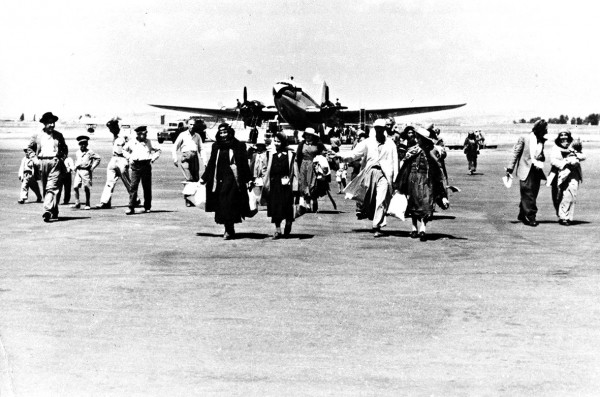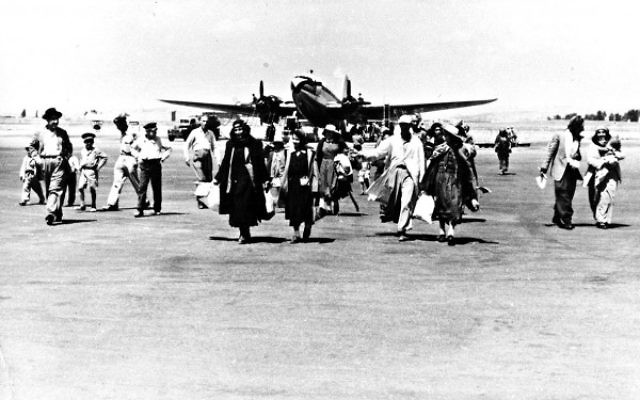SPECIAL REPORT: The evils of post-’48 exodus from Arab lands
 This Sunday is the Israeli national day for commemorating the plight of Jewish refugees from Arab lands. Stephen Oryszczuk finds out why the issue is a question of justice
This Sunday is the Israeli national day for commemorating the plight of Jewish refugees from Arab lands. Stephen Oryszczuk finds out why the issue is a question of justice
The Israeli government this year designated a new day, 30 November, to remember historic wrongs done to the Jewish people. The wrong in question was the uprooting of 850,000 Jews from ancient communities in Arab and Muslim lands, including Iran, after the founding of the State of Israel in 1948. Some call it a period of “systematic persecution” or “ethnic cleansing”.
Events will be held around the world on Sunday. There will be a Board of Deputies reception at the Jewish Museum in Camden. On Saturday at St John’s Wood Liberal Synagogue, historian Nathan Weinstock will explain “how a Belgian Ashkenazi Jew wrote the story of the eradication of Jews from Arab lands”.
Weinstock says the story “demands an understanding of the dhimma – Jewish social status under Islam – and an appreciation of the repercussions of the Zionist-Palestinian conflict, leading to the great post-World War II Jewish exodus”.
Once-equal Jewish citizens were persecuted, Jewish stores and workshops were looted, Jewish workers were fired and Jews were restricted from entering universities. Expelled from Egypt, displaced in Iraq and held hostage in Syria (on the suspicion that they would “join the Zionist enemy” and attack their country of birth), most left when they could, leaving all possessions behind. The story is one of immense sadness.
Many Sephardi Jews had deep cultural ties to the land, and influenced it greatly. Jewish writers were the foundation of Iraqi literature, for example, and in mid-19th century Egypt, the man who invented the nationalist slogan ‘Egypt for the Egyptians’ (known as ‘the Egyptian Molière’) was a Jew named Jacob Sanua. The repercussions of this huge and little-known upheaval shape today. “No understanding of the Arab-Israeli conflict is complete without taking into account the fact that half of all Israeli Jews are descended from, or are themselves, Jewish refugees from Arab or Muslim lands,” says the Board of Deputies.
But why is the issue only now being recognised? “Successive Israeli governments didn’t really make much of it, contrary to what Arab countries did for Palestinian refugees,” says Baghdad-born Edwin Shuker, who now lives in London. “It was a huge mistake on many levels. There are fewer than 5,000 Jews left in Arab lands. I am part of a dying generation. We want this narrative incorporated into the Jewish people’s story.”
For Shuker, the 30 November commemoration “opens a new chapter” in that story, and Lyn Julius, co-founder of Harif, the UK association of Jews from the Middle East and North Africa, agrees that it is a “watershed” moment. But she says the refugees themselves partly explain the slow process of recognition. “When they came to Israel in the 1950s, they compared themselves to Europe’s Jewish refugees, to Holocaust survivors.
What happened to them was far worse, so they thought ‘let’s just get on with it, let’s not make a fuss’.” It was early in the state’s creation, and the country needed to build an Israeli identity, she explains. “Forget the past and move on, that was the only way to integrate Jews from 130 countries,” says Julius.
“Politically, it was disastrous, and the Palestinians made all the running, screaming that they were the only refugees, which the world bought.” Some are cynical about the timing of the Knesset law, which came in the middle of the peace negotiations with the Palestinians earlier this year. Arab- Israeli peace process analyst Dr Constanza Musu says Israel “conducted a very systematic campaign to have the issue of refugees addressed in the negotiations”.
Other countries have already said the issue of Jewish refugees should be included in any final agreement. The Canadian government recently said it would recognise Jewish refugees, while in 2008, the US Congress declared it “inappropriate and unjust to recognise rights for Palestinian refugees without recognising equal rights for former Jewish, Christian, and other refugees from Arab countries”.
It added that “any resolutions relating to the issue of Middle East refugees… must also include a similarly explicit reference to the resolution of the issue of Jewish refugees from Arab countries”. The struggle for equal recognition will be greatly aided by Sunday’s commemoration, but is that all Jewish refugees (and their descendants) want? “In an ideal world they’d like both recognition and redress, which includes compensation,” says Julius. “But the latter is difficult. Arab states are in denial over their role. They also can’t afford it. Some can’t even feed their own people, while others are fighting to survive.”
For Shuker, this is not about money. “I’m not looking for thousands of dollars for my home in Baghdad,” he says. “Handled confrontationally, it can be a deal-breaker, but it can also be a bridge-builder.
But Jews and Palestinians have claims. We need a peace fund, to safeguard synagogues in the Arab world and educate Arab children fairly. It’s about justice, about creating a bridge. We need to work together to solve the problem.”

Thank you for helping to make Jewish News the leading source of news and opinion for the UK Jewish community. Today we're asking for your invaluable help to continue putting our community first in everything we do.
For as little as £5 a month you can help sustain the vital work we do in celebrating and standing up for Jewish life in Britain.
Jewish News holds our community together and keeps us connected. Like a synagogue, it’s where people turn to feel part of something bigger. It also proudly shows the rest of Britain the vibrancy and rich culture of modern Jewish life.
You can make a quick and easy one-off or monthly contribution of £5, £10, £20 or any other sum you’re comfortable with.
100% of your donation will help us continue celebrating our community, in all its dynamic diversity...
Engaging
Being a community platform means so much more than producing a newspaper and website. One of our proudest roles is media partnering with our invaluable charities to amplify the outstanding work they do to help us all.
Celebrating
There’s no shortage of oys in the world but Jewish News takes every opportunity to celebrate the joys too, through projects like Night of Heroes, 40 Under 40 and other compelling countdowns that make the community kvell with pride.
Pioneering
In the first collaboration between media outlets from different faiths, Jewish News worked with British Muslim TV and Church Times to produce a list of young activists leading the way on interfaith understanding.
Campaigning
Royal Mail issued a stamp honouring Holocaust hero Sir Nicholas Winton after a Jewish News campaign attracted more than 100,000 backers. Jewish Newsalso produces special editions of the paper highlighting pressing issues including mental health and Holocaust remembrance.
Easy access
In an age when news is readily accessible, Jewish News provides high-quality content free online and offline, removing any financial barriers to connecting people.
Voice of our community to wider society
The Jewish News team regularly appears on TV, radio and on the pages of the national press to comment on stories about the Jewish community. Easy access to the paper on the streets of London also means Jewish News provides an invaluable window into the community for the country at large.
We hope you agree all this is worth preserving.






















